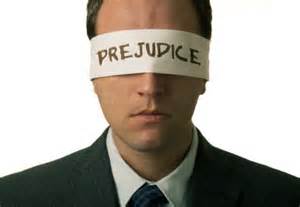
02 Dec ‘Careful, Your Prejudice is Showing
There is much discussion in this country right now on the topic of racial prejudice. Recent events in Ferguson, Missouri have pushed it to the forefront of national media and local minds alike.
But what is prejudice? “Prejudice is prejudgment, or forming an opinion before becoming aware of the relevant facts of a case. The word is often used to refer to preconceived, usually unfavorable, judgments toward people or a person because of gender, political opinion, social class, age, disability, religion, sexuality, race / ethnicity, language, nationality or other personal characteristics.” (Wikipedia)
In its simplest form, prejudice results from making assumptions about another’s actions, intentions or values without really knowing. We have all demonstrated prejudice, and we have all been victims of it.
One might argue that prejudices—broad generalizations about groups of individuals—are aimed at protecting us from potential danger. But we easily see that these assumptions do more harm than good.
One interesting phenomenon is the when one group or individual assumes that another is prejudice—holds negative, unfounded opinions—against the former. One racial or religious group may assume, for example, that another group hates them when it is simply not true.
But even if most members of “Group A” do not initially hold negative assumptions about “Group B”, many in Group A will certainly come to harbor negative feelings and assumptions after Group B accuses, protests and threatens Group A. Even the kindest members of Group A might eventually come to harbor the very thoughts and assumptions Group B fears that Group A holds, all based upon the mistaken actions—based upon mistaken assumptions—of a few members of Group B.
(Yes, that was about as clear as mud, but I didn’t know how else to say it.)
But these prejudices don’t have to be pointed at anything as broad as national, ethnic, or language groups. They can be as small or as local as one community, social network or family against another. I often hear statements like “those Rigby people”, “those BYU-Idaho types”, or “those people up on the hill”. And if you have lived in a community long enough almost any last name can conjure up beliefs or assumptions about those who bear it.
You know, if I were some malevolent force—some adversary to all mankind—I would work very hard to provoke just such thoughts and actions. In fact, if I had some evil intent to disrupt people from loving and working together I would stoke those flames as much as possible. When people can no longer see the good in one another we are all lost.
We can all see the damage resulting from such prejudices, but how do we stop them?
We begin with how we speak in our homes, because our words and actions establish the patterns of how our children will think.
Parents who make unkind remarks about others, even if perhaps some of those remarks seem justified, are accidentally teaching their children to make unfounded assumptions about others. Granted, others make mistakes, even great mistakes at times. But it is not our responsibility to label others for what they do. When those remarks seem to cast a broad net over a group of any kind, we are accidently teaching our children to be prejudice against groups of people.
But what if I have been wronged or hurt by a group of individuals, or what if I have seen members of a group do awful things?
When I see something I dislike or see as wrong I can simply describe, in my mind, the observable action, along with the observable results of that action. I can even note my emotional response to what I see or hear (sadness, fear, discouragement) without assuming that I know what the other person was thinking. It might help to tell myself that I am guessing or imagining their motives, but that it is only a guess.
As simple—even unnatural—as this might seem, with practice you will find that many of your negative reactions will go away, including the assumptions that led to your fear or hostility toward others. When we “think out loud”, speaking in our homes in just such a manner, it helps children to discern between their thoughts, their feelings and facts. It teaches them to see things more clearly and to set aside unfounded assumptions.
The problems of prejudice are real for all of us. Our prejudices keep us from knowing and loving others just as they are, and keep us all from recognizing that we are all members of the same race—the human race—and children of the same loving Father.
